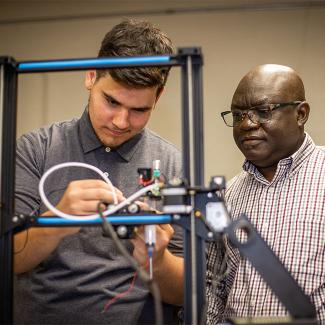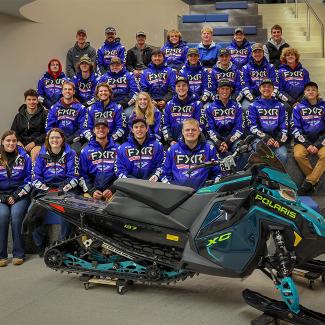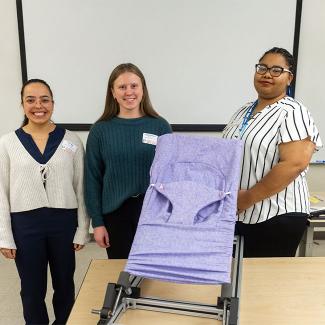What you'll learn in the Mechanical Engineering program
At UW-Platteville, mechanical engineering graduates find that their versatility, structured problem-solving skills, imagination, and persistence make them among the most sought-after employees in industries that include aerospace, automation, automotive, computer, and construction, as well as the medical field. Additionally, a bachelor's in mechanical engineering provides an excellent background for those seeking advanced degrees in biomedical engineering, aerospace engineering, and business administration.
The mechanical engineering major is the most popular on campus. The field is in demand, highlighting the increasing reliance on mechanical engineers across various industries. Each year, an average of 19,800 mechanical engineering positions will become available, driven by the need to replace retiring workers and those transitioning to other fields.
These promising statistics underscore the field's vitality and its potential for long-term career stability. As the need for engineers in Wisconsin, the tri-state area, and the nation continues to grow, UW-Platteville aims to meet the demand from industry. As one of the region's leading mechanical engineering colleges, our graduates are prepared for successful careers in manufacturing, development, design, research, sales, field engineering, and management.
Mechanical Engineering program overview
A cornerstone of one of the most renowned engineering schools in the Midwest, studying mechanical engineering with UW-Platteville’s Department of Mechanical and Industrial Engineering puts you on the path to success. As a mechanical engineer, you’ll design, develop, build, and test everything from small individual parts and devices, like microscale sensors and inkjet printer nozzles, to large systems like spacecraft and machine tools, and everything in between, like biomedical devices.
Mechanical engineering is one of the most versatile and impactful engineering disciplines, underpinning technological advancements that improve health, safety, and quality of life. At its core, the field is divided into two broad areas: mechanical systems and thermal systems. Mechanical systems encompass the design of mechanisms, the analysis of material strength, and the study of failure and durability. In contrast, thermal systems delve into energy conversion, heat transfer, and fluid dynamics, which are integral to creating efficient power and renewable energy solutions.
The Mechanical Engineering program is accredited by the Engineering Accreditation Commission of ABET, under the commission’s General Criteria and the Program Criteria for Mechanical and Similarly Named Engineering Programs.
Our program emphasizes the practical aspects of theory while demonstrating a commitment to building students’ teamwork and communication skills. The modern labs feature digital data acquisition and processing, providing students with valuable hands-on experience, and the excellent student-to-faculty ratio assures dedicated, quality interaction with the program’s faculty and advisors. These qualities make our campus the best place to earn a bachelor of science in mechanical engineering in Wisconsin.
View the Mechanical Engineering Program’s Student Outcomes and Program Educational Objectives.
Career in Mechanical Engineering
The field of mechanical engineering is broad. Mechanical engineers use their critical thinking and problem-solving skills to analyze opportunities and design all types of products, tools, appliances, engines, machines, and more. In the process of designing, mechanical engineering professionals must be able to investigate problems and recommend solutions, develop and test prototypes, test and analyze results, and oversee the manufacturing process. While mechanical engineers use computers extensively, they also tend to work a lot with their hands, rather than sitting at a desk in front of a computer all day.
Mechanical engineering is ideal for creative problem-solvers passionate about improving everyday life. These professionals design and innovate products and systems that transform industries, contributing significantly to health, safety, and sustainability.
At UW-Platteville, the mechanical engineering bachelor's degree program prepares students for rewarding careers where they can make a meaningful impact. Graduates find opportunities in diverse fields such as aerospace, automotive, biomedical, and construction engineering. They hold titles such as mechanical engineer, robotic engineer, and biomedical engineer, working on impactful projects like medical devices, fuel-efficient vehicles, and energy-efficient systems.
With a focus on hands-on learning, UW-Platteville equips students with the skills employers value, from technical expertise to teamwork and communication. This practical foundation prepares graduates to excel in roles across research, design, and management, ensuring a fulfilling and impactful career in mechanical engineering.
Some examples of the many job titles people with mechanical engineering degrees hold include:
- Aerospace engineer
- Automotive engineer
- Biomedical engineer
- Construction engineer
- Manufacturing engineer
- Mechanical designer
- Mechanical engineer
- Product designer
- Research engineer
- Robotic engineer
- Sales engineer

Discover by doing
You'll gain the valuable technical, communication, and collaboration skills employers seek through our Mechanical Engineering program. We focus on hands-on learning, which means you will practice designing, developing, building, and testing complex mechanical systems and discovering how to solve challenges.
Biomedical Engineering Emphasis
Biomedical engineering is a broad field that combines engineering and science and applies them to the human body to improve the lives and health of all people. The biomedical emphasis in mechanical engineering at UW-Platteville builds on our university’s strengths in mechanical and electrical systems, anatomy and physiology, and hands-on experiences to give students skills in medical device development, so that they are ready to dive into a career in the medical device industry.
- Only seven more credits than the Bachelor of Science in Mechanical Engineering
- Research opportunities with faculty
- Skills to succeed in biomedical industry, as well as all others because of the base in mechanical engineering
- Senior design projects with biomedical companies
Manufacturing and Design Emphasis
Students pursuing a BS in mechanical engineering can choose an emphasis in manufacturing and design. Students will learn how to conceptualize, design, fabricate, and produce their own ideas and discover new ways to help companies be more effective and efficient in their manufacturing processes.
- Course work includes advanced manufacturing processes, design for manufacturability, finite elements, composite materials, and hot metal casting
- Research opportunities with faculty
- Skills to succeed in the manufacturing industry, using mechanical engineering principles and practices
- Senior design project working with employers







